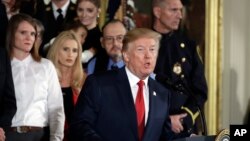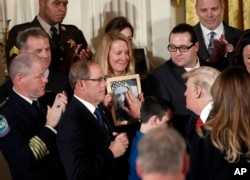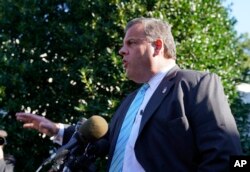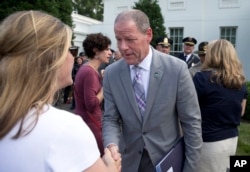U.S. President Donald Trump has declared a nationwide public health emergency to address an opioid crisis he says the federal government is already combating "on all fronts."
Trump, speaking in the White House East Room on Thursday to an audience of about 180 people, including recovering addicts and family members of victims, said "as Americans we cannot allow this to continue."
WATCH: Advocates Welcome Trump's Emergency Declaration on Opioid Crisis as Good First Step
Two attendees on the risers behind the president held pictures of their loved one who had died of overdoses.
The Centers for Disease Control and Prevention said drug overdoses killed 64,000 Americans last year. And of those deaths, opioids, which act on the nervous system to relieve pain, are estimated to have killed about 35,000 people, the National Institute of Drug Abuse found.
"More people are dying from drug overdoses today than from gun homicides and motor vehicles combined," Trump said, noting that this makes it the "leading cause of unintentional death" in America.
Addiction in U.S.
The president, in his remarks, spoke more broadly about addiction.
"Millions of our fellow citizens are already addicted. That's the reality," Trump said.
He mentioned his older alcoholic brother, Fred, who died at the age of 43, who repeatedly told Trump "don't drink … and to this day I've never had a drink."
Trump vowed his administration would push lawsuits against people and companies involved in fueling the abuse of powerful and addictive painkillers. He also said he would raise the issue of production and export of fentanyl, which is stronger than heroin, next month in Beijing with Chinese President Xi Jinping.
"He will do something about it," Trump predicted.
At the State Department on Thursday, James Walsh, acting principal deputy assistant secretary for International Narcotics and Law Enforcement Affairs, said two major ingredients needed to produce fentanyl are now internationally controlled, so criminals will have a tougher time producing the drug.
The president said the United States will also work with Latin American countries to stem the tide of opioids into the United States.
"An astonishing 90 percent of the heroin in America comes from south of the border, where we will be building a wall which will greatly help in this problem," he said.
Walsh said the U.S. is using diplomatic leverages both bilaterally and multilaterally to protect U.S. communities and "stem the flow of these killer drugs. ... We're also using foreign assistance to strengthen Mexico's ability to stop illicit drugs from reaching our border."
Federal funds
Trump’s declaration gives states more flexibility to use federal funds, although it will not provide funds specifically for the opioid crisis.
Administration officials said they would urge Congress, during end-of-the-year budget talks, to add money to an emergency health fund that has not been replenished in years.
"This is an enormous first step," said New Jersey Governor Chris Christie, who chairs the President's Commission on Combatting Drug Addiction and the Opioid Crisis.
Asked by reporters about criticism from lawmakers, such as House Democratic leader Nancy Pelosi who is calling the declaration "words without the money," Christie replied: "For members of Congress to say ‘where’s the money?’ I read the Constitution. The money starts with them. They’re going to have to show a commitment to this now."
There are warnings that without significant new funds Trump’s initiative likely will not succeed.
"The problem is enormous and requires a similar investment in a comprehensive strategy that includes primary prevention," according to Becky Salay of the Trust for America's Health, a Washington-based public health research and advocacy group.
Trump did not declare a more comprehensive national state of emergency as recommended by Christie’s commission. That would have provided states access to funding from the Federal Disaster Relief Fund, which is used to help manage response and recovery efforts associated with disasters such as hurricanes.
Long-term crisis
Administration officials say a national state of emergency would not have been the best approach for a long-term crisis and would not have provided authorities with resources the government does not already have.
"I was very comforted by the president's remarks today," said Dr. Stefan Maxwell, a neonatalogist at the helm of several pilot projects for addicted mothers in West Virginia, one of the worst opiate-afflicted states.
"I’m hoping that some of the funding that going to come from some of the initiatives will help us continue this work in West Virginia," Maxwell told reporters in front the White House West Wing.
Knoxville Police Chief David Rausch, who also attended the president’s announcement, noted the crisis has affected his family members in the state of Tennessee.
"It's personal to me," Rausch said. "We're seeing deaths every day."
Trump, according to the police chief, "laid out a plan that quite frankly will be impactful and effective. … You've got to start with prevention and prevention is a huge part of this plan."
The memorandum signed by Trump on Thursday directs all federal agencies to use emergency powers at their disposal to reduce opioid deaths.
The declaration also broaden the use of telemedicine, removes some regulations and shifts some federal HIV money to help opioid addicts.
The emergency will be in effect for 90 days and can be repeatedly renewed.
A final report from the presidential commission headed by Governor Christie is due to be released next week and Trump on Thursday vowed that his administration would be quickly acting on some of the key recommendations it makes.
Nike Ching at the State Department contributed to this report.




